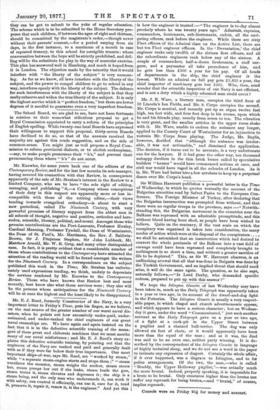Mr. Knowles, for some years back one of the editors
of the Contemporary Review, and for the last few months its sole manager, having severed his connection with that Review, in consequence apparently of the sale of Mr. Strahan's interest in the Review to a limited Company, who are to have "the sole right of editing, managing, and publishing " it,—a Company whose conceptions of their duty in this respect are apparently more or less in- compatible with those of the retiring editor,—their views tending towards evangelical orthodoxy—is about to start a never periodical, called The Nineteenth Century, with very powerful promises of literary support from the ablest men in all schools of thought, negative and positive, orthodox and here- eodox, scientific, literary, political, and moral. Amongst those who promise contributions are the Poet-Laureate, Professor Huxley, Cardinal Manning, Professor Tyndall, the Dean of Westminster, the Dean of St. Paul's, Mr. Martineau, the Rev. J. Baldwin- Brown, Sir J. Fitzjames Stephen, Sir John Lubbock, Mr. Matthew Arnold, Mr. W. R. Greg, and many other distinguished men. In fact, it is pretty evident that a considerable number of those whose contributions to the Contemporary have attracted the attention of the reading world will be found amongst the writers for the Nineteenth Century. In .a correspondence on the subject Tublished this week in the Times, Mr. Strahan has unfortu- nately used expressions tending, we think, unduly to depreciate the services rendered by Mr. Knowles to the Contemporary Review. Those who have known that Review best and moat recently, best know also what those services were ; they also will be the persons whose anticipations for the Nineteenth Century will be at once the highest and the least likely to be disappointed.


































 Previous page
Previous page